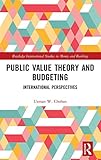Public Value Theory and Budgeting : International Perspectives / Usman W. Chohan.
Material type: TextSeries: Banking, money and international financePublisher: London ; New York : Routledge, Taylor & Francis Group, 2019Edition: 1st EditionDescription: xix, 146 pages : illustrations ; 25 cmContent type:
TextSeries: Banking, money and international financePublisher: London ; New York : Routledge, Taylor & Francis Group, 2019Edition: 1st EditionDescription: xix, 146 pages : illustrations ; 25 cmContent type: - text
- unmediated
- volume
- 9780367077693
- 352.4 23 CHO-431(D)
- JF1351 .C464 2019
| Item type | Current library | Collection | Call number | Status | Barcode | |
|---|---|---|---|---|---|---|
 Books
Books
|
PIPS Library | 352.4 CHO-P 434(D) (Browse shelf(Opens below)) | Available | 434(D) | ||
 Books
Books
|
PIPS Library | NFIC | 352.4 CHO-P 431(D) (Browse shelf(Opens below)) | Available | 431(D) |
Browsing PIPS Library shelves Close shelf browser (Hides shelf browser)

|

|

|

|
No cover image available |

|

|
||
| 352.3/802854678 MIL-D 1603 Digital governance : applying advanced technologies to improve public service / | 352.3/8709549149 HUL-G 533 Government of paper : the materiality of bureaucracy in urban Pakistan / | 352.4 CHO-P 431(D) Public Value Theory and Budgeting : International Perspectives / | 352.4 CHO-P 434(D) Public Value Theory and Budgeting : International Perspectives / | 352.53095491 NIA-M 477 The Manual of Public Procurement Laws : Federal, Punjab, Sindh, K.P.K. | 353 CHA-D 1376 Diplomatic Footprints / | 353.130973 ROS-P 363 The politics of United States foreign policy / |
"We are now trying to create value in a globalized world, with supranational entities, with new international alliances and institutions, in a frightening post-Truth era. How can public managers grapple with these emerging realities? This book seeks to provide answers to such public value questions by applying powerful budgeting perspectives. Using case studies of independent budget offices, key fiscal instruments, and leading public value frameworks, this book stands out in its use of budgetary lenses to answer pertinent questions about the multidimensional processes of value creation by and for a wider society. Pushing the debate on public value forward and taking it onto the global stage, the book asks whether public value (and other public administration theories) are applicable beyond the traditional context of the pro-globalization Western liberal democracies in which they were conceived. It does this by exploring the realms of developing countries, supranational entities, and post-Communist societies, among others. Finally, it presents these explorations in light of very recent sociopolitical trends and phenomena, including the growth of civil society, the Global Financial Crisis, the Illiberal democracy, and the post-truth era. Tailored to an audience comprising public administration scholars, students of government, budget practitioners, and social scientists interested in contemporary problems of values in society, this book helps to advance public administration thought by extending public value theory into new contexts and relating it to the growing global challenges of public life"-- Provided by publisher.
There are no comments on this title.
